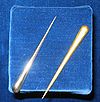- John Haygarth
-
John Haygarth (* 1740 in Garsdale; † 10. Juni 1827) war ein britischer Mediziner. Er beschrieb den Placeboeffekt und ging neue Wege, um die Ausbreitung fieberhafter Erkrankungen (Infektionskrankheiten) und der Kuhpocken einzudämmen.
Bereits 1799 untersuchte Haygarth die Wirkung eines damals für teueres Geld zu kaufenden Medizinproduktes, des "Perkins Traktors". Dieser besteht letztlich nur aus einem einfachen Metallstab und sollte eine Krankheit "herausziehen" können. Haygarth verwendete Holzstäbchen mit dem gleichen Erfolg und bewies so, daß man sich das Geld für den "Perkins Traktor" getrost sparen konnte. Seine Entdeckung (Placeboeffekt der Stäbchen) veröffentlichte er in seinem Buch “On the Imagination as a Cause & as a Cure of Disorders of the Body.”.
Literatur
- Booth C. C.: John Haygarth, FRS (1740-1827): a physician of the enlightenment (Band 254 von Memoirs of the American Philosophical Society), American Philosophical Society, 2005, ISBN 0871692546, hier online
Wikimedia Foundation.

